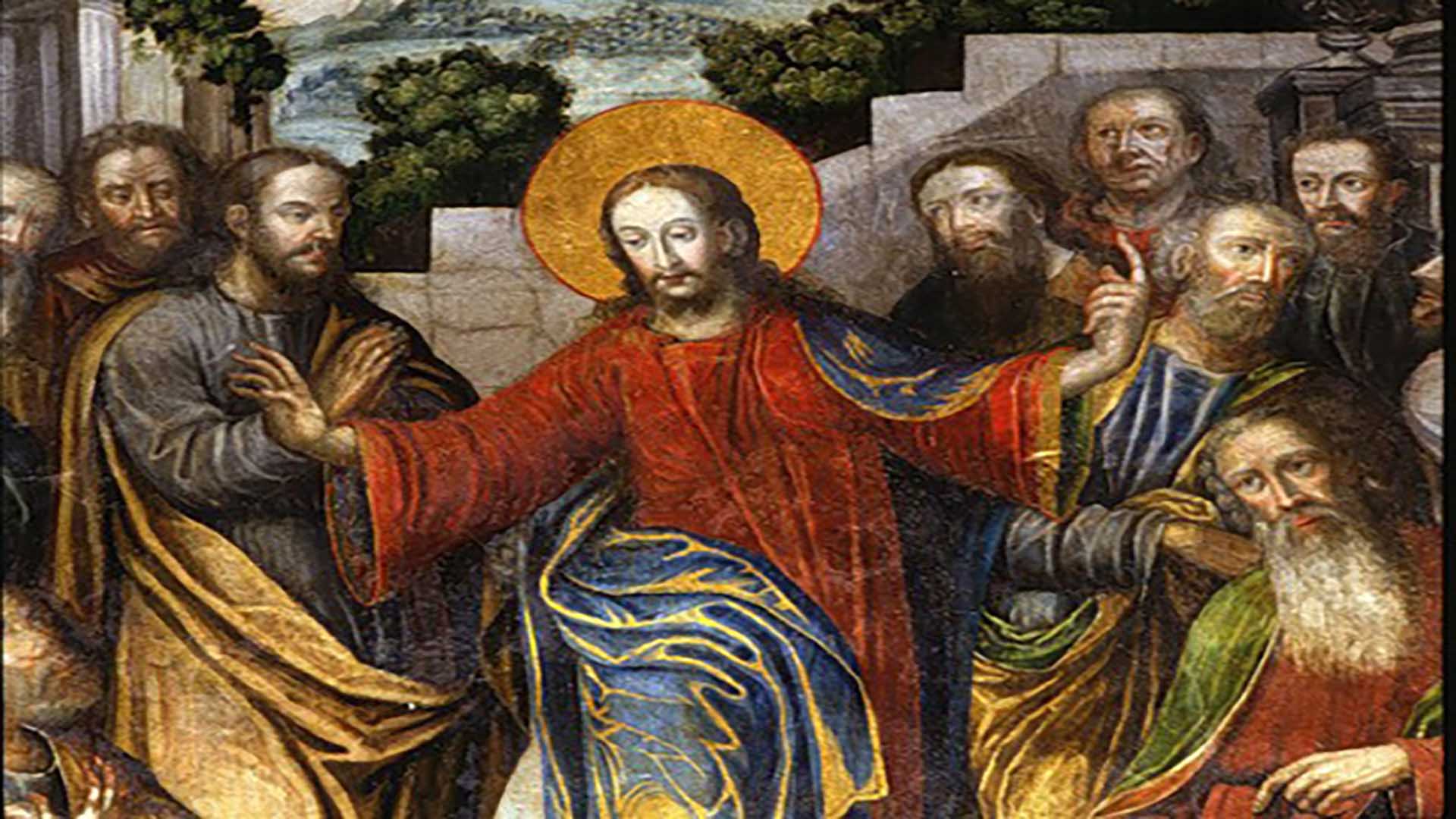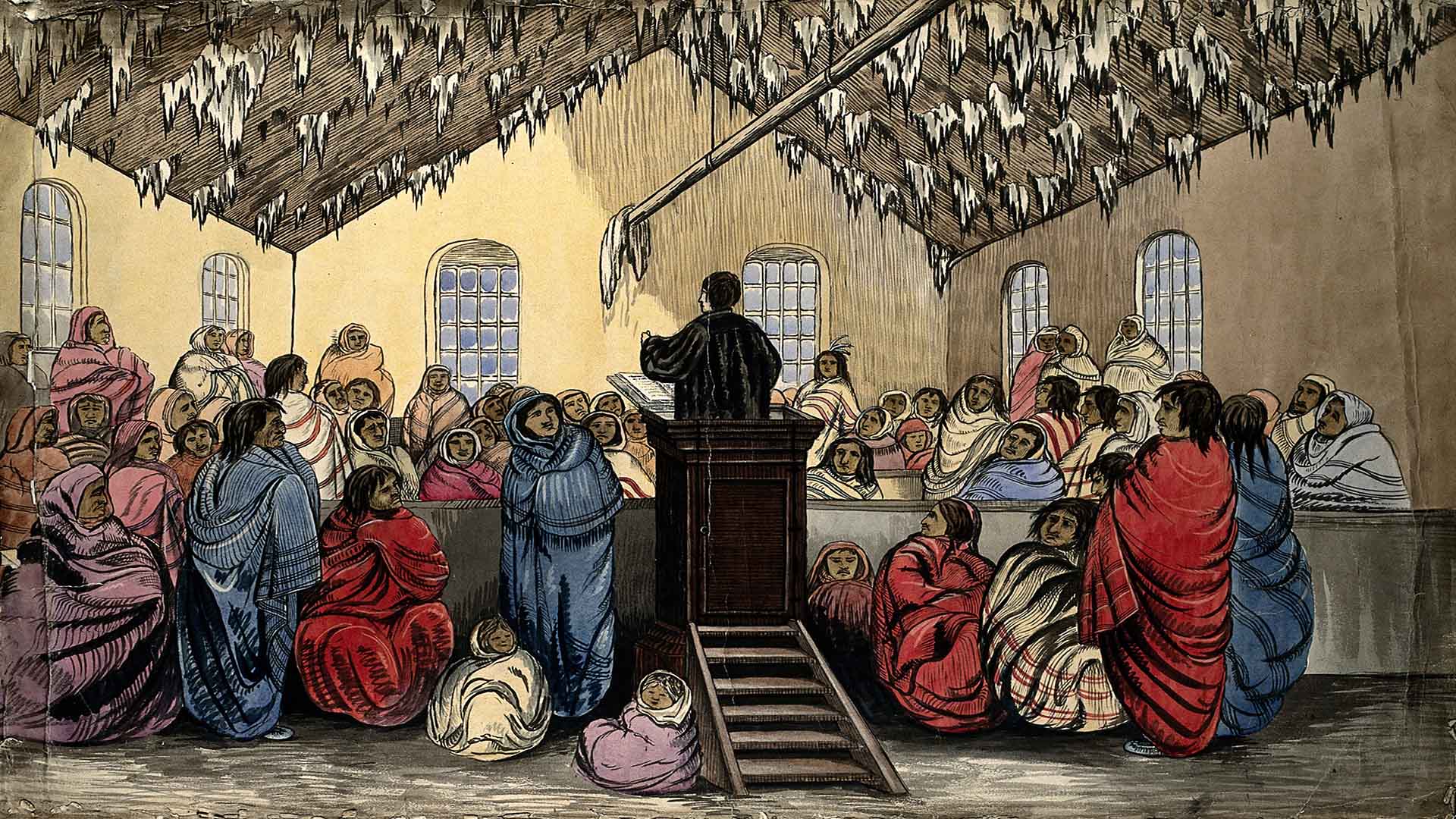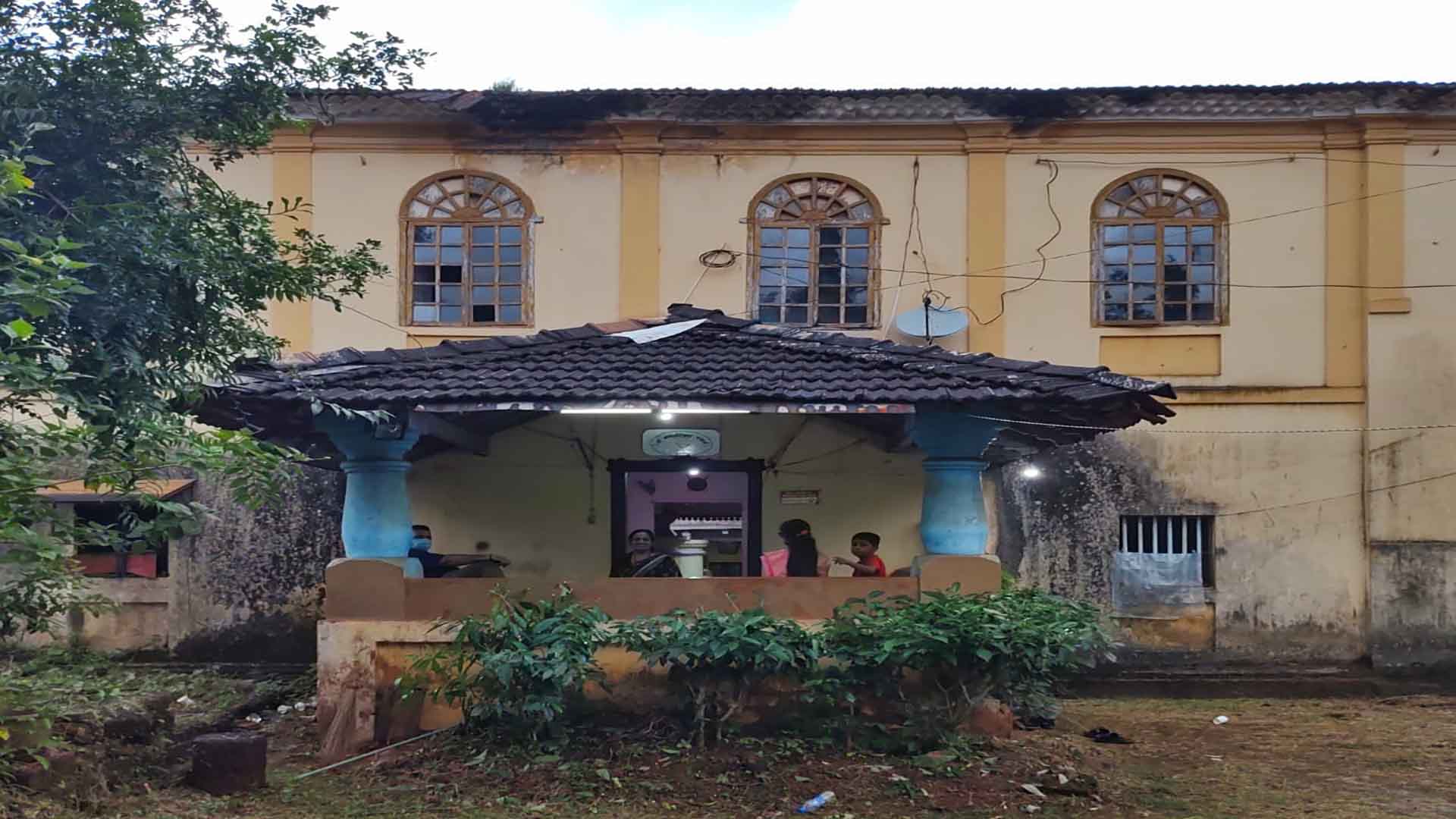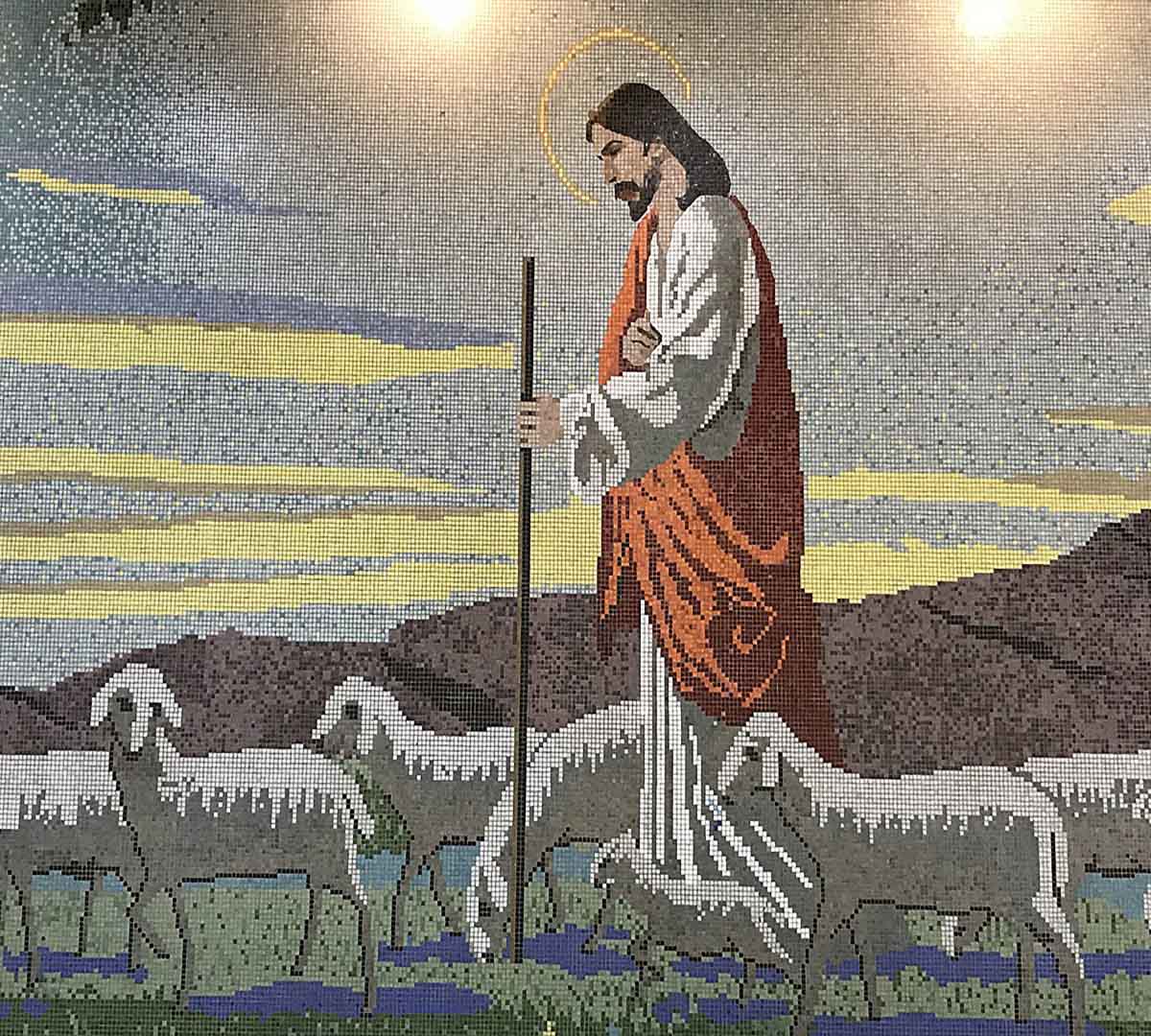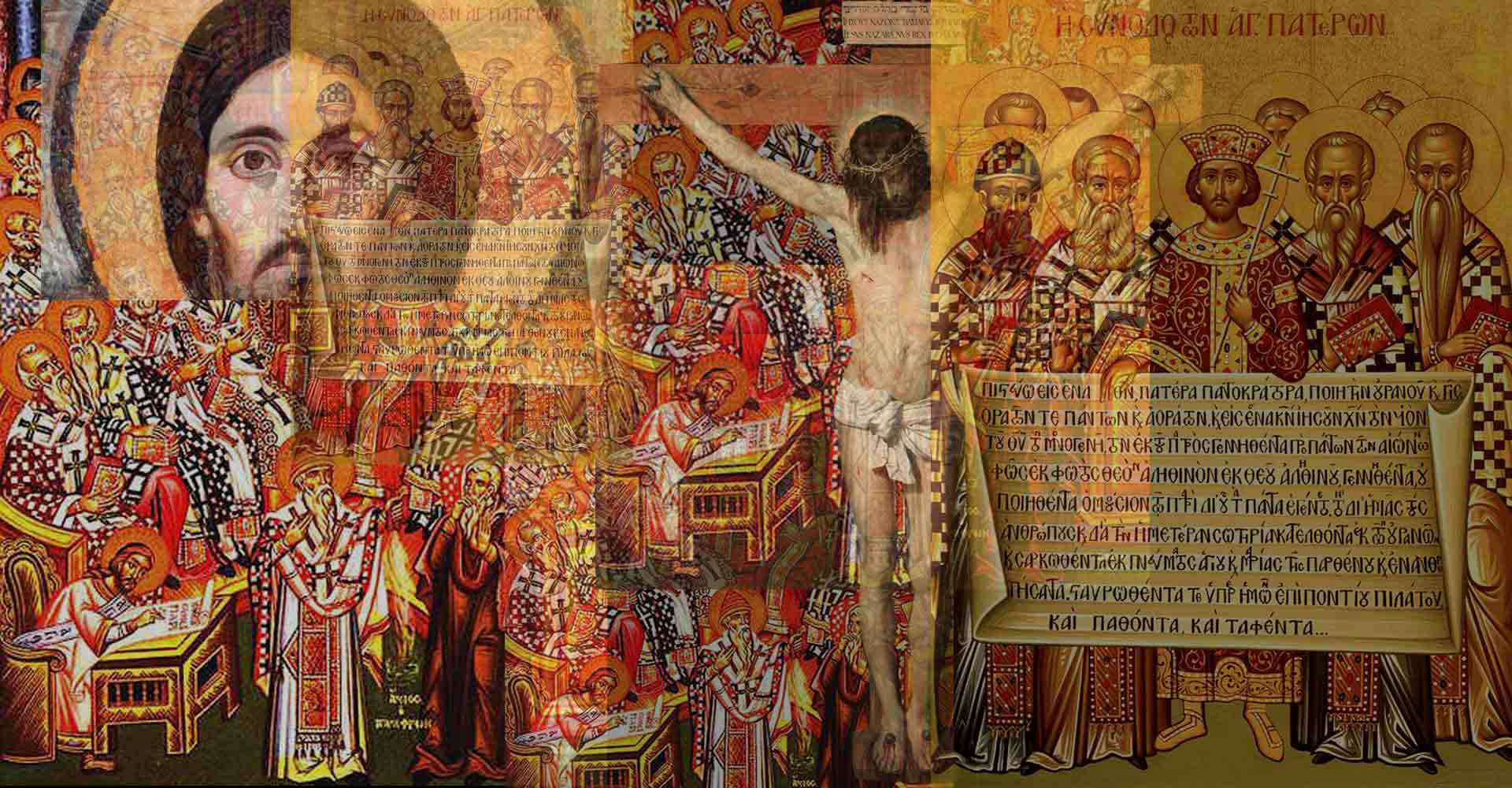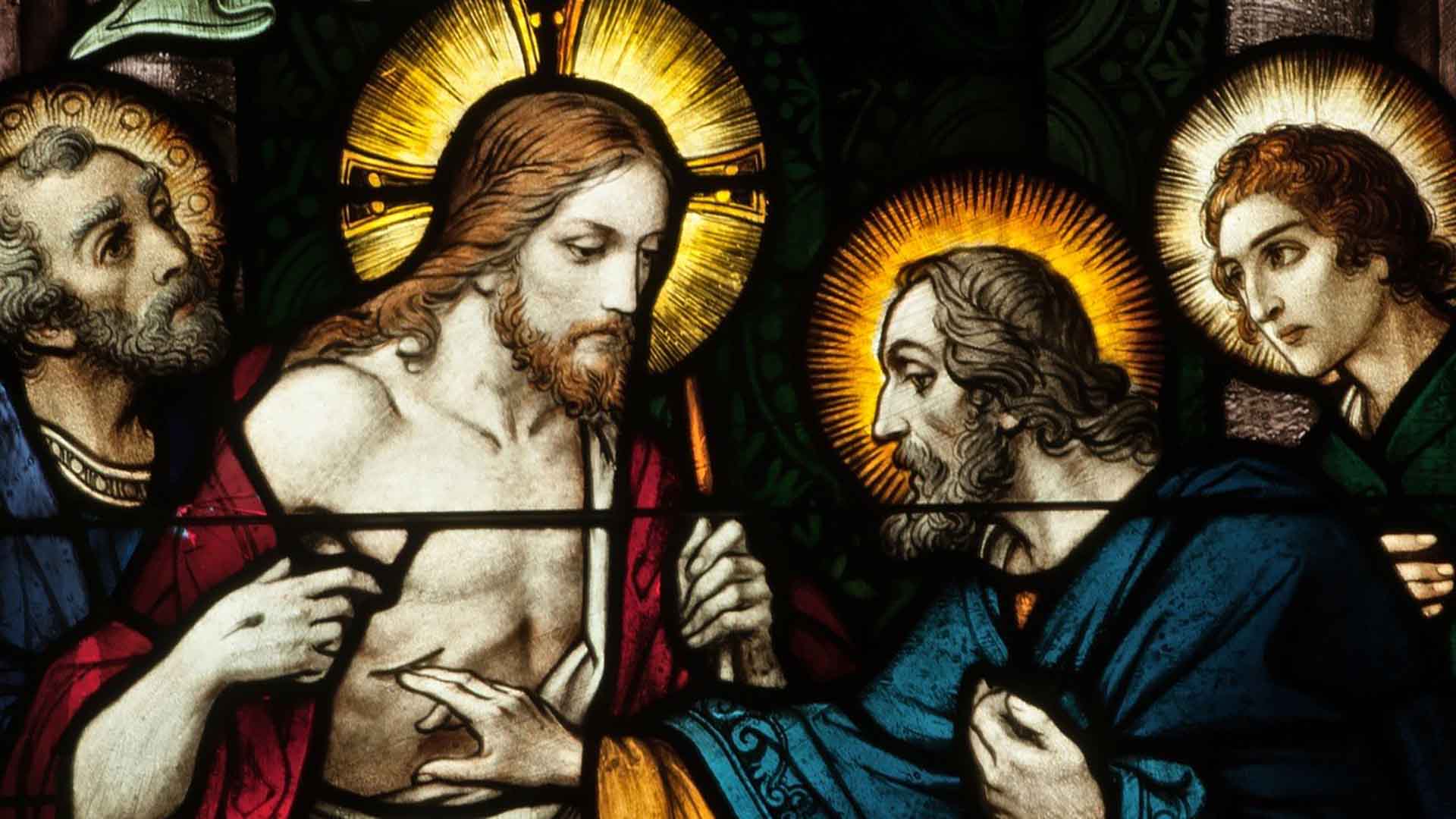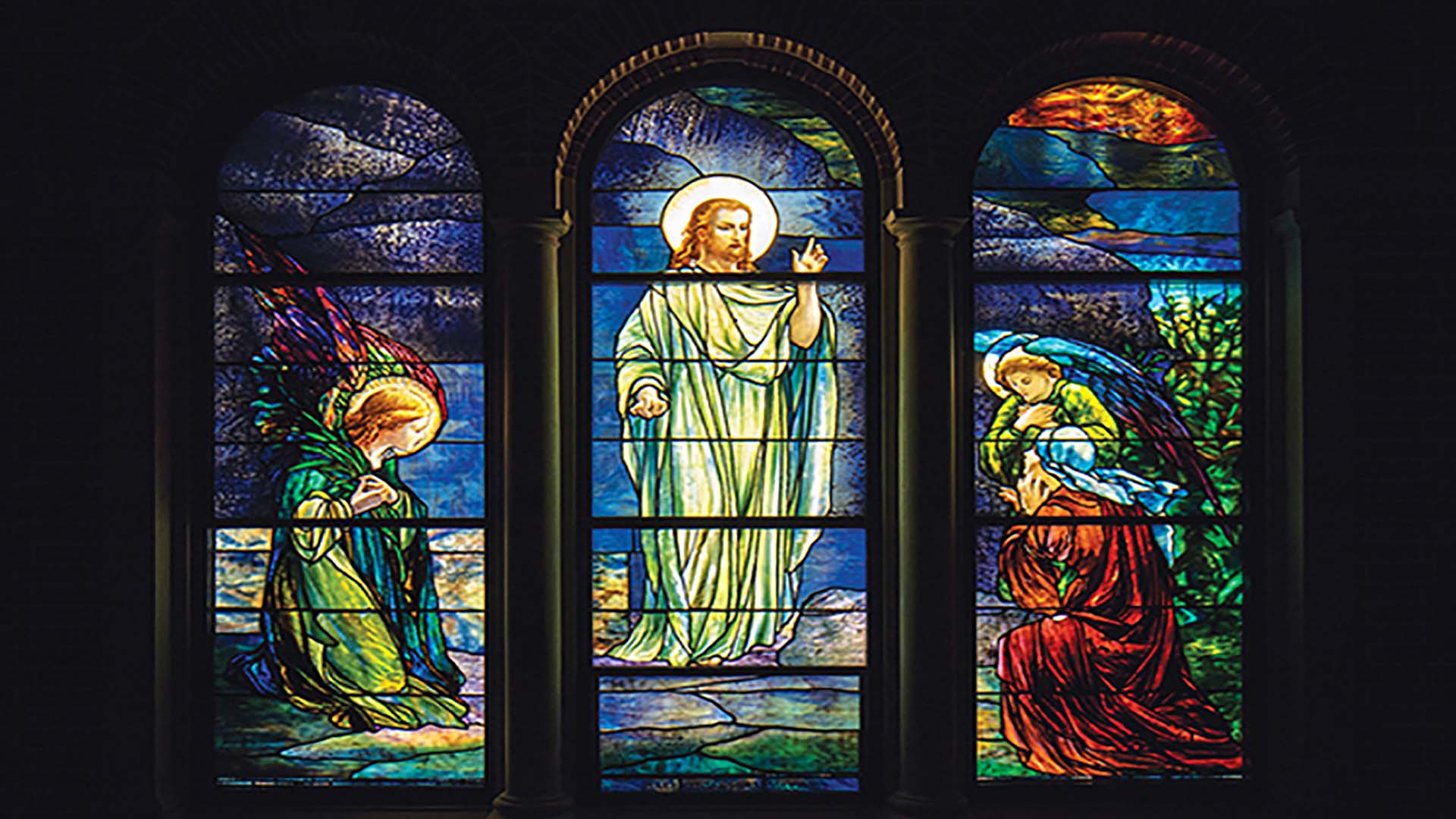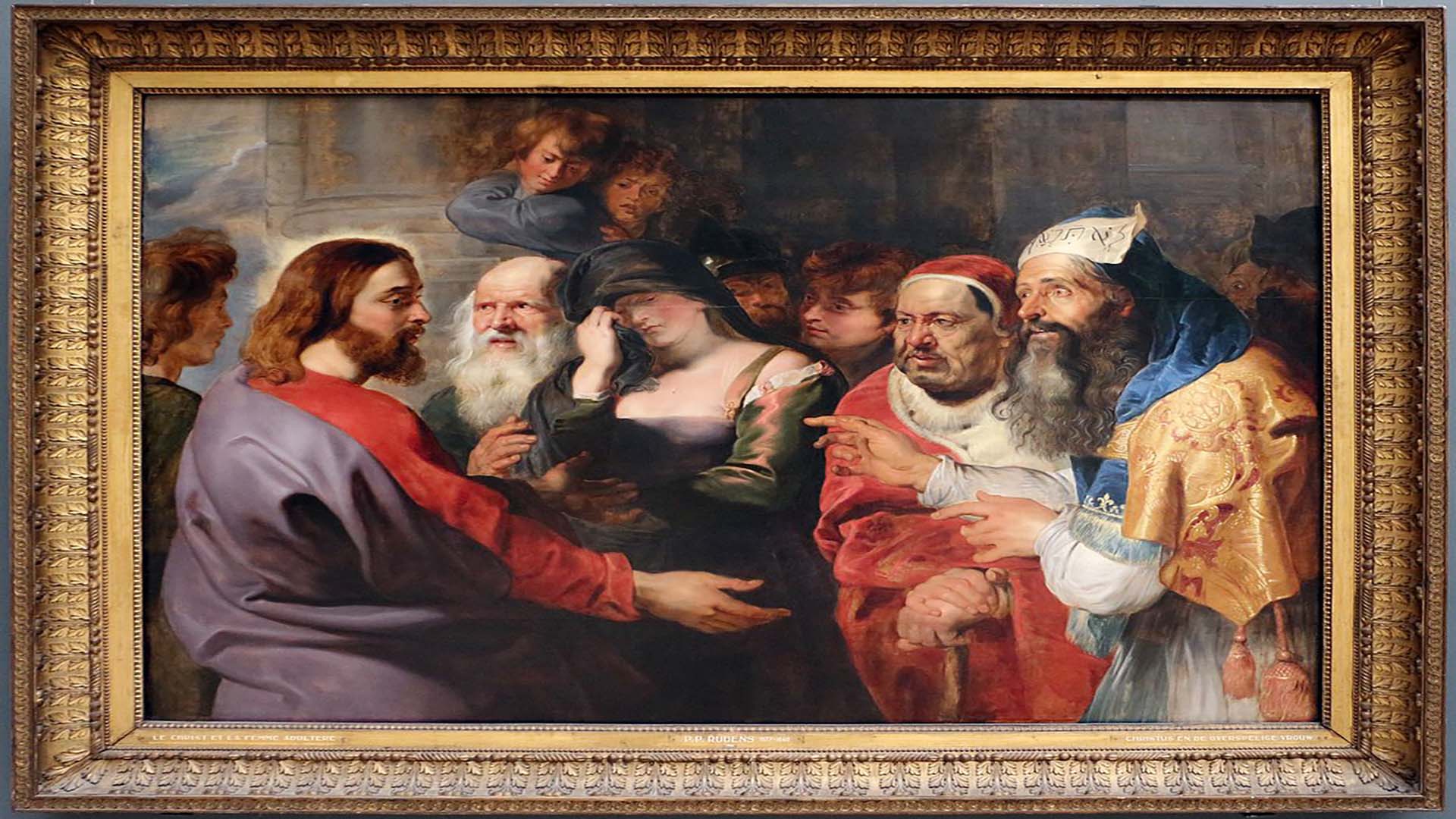Strengthened by the Holy Spirit
With the Ascension and Pentecost round the corner, the role of the Holy Spirit has come into sharp focus. Today’s Gospel (Jn 14; 23-29) reminds us that Jesus at the Last Supper had assured His disciples that they would not be orphaned; He would remain for ever in their midst through the Holy Spirit: ‘The Counsellor, the Holy Spirit, whom the Father will send, he will teach you all things, and bring to your remembrance all that I have said to you.’
It is reassuring to have such a Paraclete – Advocate, Helper, Comforter, Intercessor; it is equally heartening that Jesus promises a close relationship with whoever loves Him and keeps His Word. But what does it mean to love Jesus? It means doing the will of His Father. And what is His Father’s will? It comprises all that He has decreed in love and is now found in Church teaching and sacred Tradition.
Amor vincit omnia: love conquers everything. Love is indeed a harbinger of peace – which is priceless when it comes from Jesus! It is a peace ‘not as the world gives’, and so, irreplaceable. The Lord’s peace is not an insurance policy that promises 'peace of mind'; it is rather a state of being that comes about from knowing who we are, why we are here and what is our final destination. It is a peace that comes from having the right priorities: putting God above all people and all things. It is a peace that comes from making God the centre of our lives. One of my favourite hymns says it all: ‘No one can give to me that peace which my Risen Lord, my Risen King, can give.’
It is clear from the First Reading (Acts 15: 1-2, 22-29) that the first Christians depended on the Holy Spirit for guidance, and they practised love and peace. Of course, it was never a smooth ride: despite the indwelling of the Holy Spirit, the community witnessed infighting. But what is marvellous is that they resolved their conflicts in love and peace; through consultation, dialogue, consensus.
 Consider that thorny issue of whether or not pagans had to go through the rituals of Judaism (e.g. circumcision for male converts) before they embraced Christianity. Paul and Barnabas consulted the Apostles and elders back in Jerusalem. After they had found a feasible solution, at what came to be called the first council of Jerusalem, they were quick to reach out to their brethren in Antioch, Syria and Cilicia: they did not impose circumcision upon the catechumens of both Jewish and pagan origin, but they encouraged them, with due reason, to abstain from what was sacrificed to idols; from blood and what was strangled; and from unchastity.
Consider that thorny issue of whether or not pagans had to go through the rituals of Judaism (e.g. circumcision for male converts) before they embraced Christianity. Paul and Barnabas consulted the Apostles and elders back in Jerusalem. After they had found a feasible solution, at what came to be called the first council of Jerusalem, they were quick to reach out to their brethren in Antioch, Syria and Cilicia: they did not impose circumcision upon the catechumens of both Jewish and pagan origin, but they encouraged them, with due reason, to abstain from what was sacrificed to idols; from blood and what was strangled; and from unchastity.
It is obvious that the Apostles and the elders exercised great pastoral care. Later, this model of social, emotional and spiritual support became integral to evangelisation of prospective converts and neo-converts the world over (including Goa, way back in the sixteenth century). The Holy Spirit became an instrument of the Lord’s peace: where there was hatred, he sowed love; where there was injury, pardon; where there was doubt, faith; where there was despair, hope; where there was darkness, light; where there was sadness, joy. After all, peace, love and joy are among the many fruits of the Holy Spirit.
Finally, from the Second Reading (Rev 21: 10-14, 22-23) we understand that with Emmanuel (God with us) and the fruits of the Holy Spirit we come close to Heaven, which is the new and eternal Jerusalem. The angel showed St John a holy city perched on a high mountain. There was no temple in the city: ‘its temple is the Lord God the Almighty and the Lamb’. There was no more sun and moon: the glory of God was its light, the Lamb its lamp. This is where we all belong; our citizenship lies in Heaven. What a privilege!
Who can deny that our Christian identity is a privilege? But, at the same time, privilege entails responsibility – noblesse oblige! Thus, we are called to be temples of the Holy Spirit, the salt of the earth and the light of the world. We are called to pray for peace in our personal lives and in the world. As a spiritual exercise, it would also be a good idea to identify places that are in need of liberation from the scourge of sin and evil; and when we exchange a sign of peace at Mass, dearly wish that the peace of Jesus be always present in our hearts and minds. To crown it all, let us make the eternal city the goal of our earthly pilgrimage, with the Holy Spirit as our Guide.
Doing everything in love
Why would a Francis Xavier or a Joseph Vaz travel as far as they did, renouncing every comfort and honour? Despite the distance of time, their life journey, or even that of a missionary in contemporary India, is so evocative of the efforts put in by the early church leaders. At that time, there were no appropriate church buildings, trained clergymen, schools, parishes, or even literature. The New Testament had still not been put together, so, the apostles had to draw lessons from the Jewish books, discover in them a sign of Christ, and teach accordingly. The untiring apostles would be on their beat, nurturing the communities that they had set up in love.
In the First Reading (Acts 14: 20-26), Paul and Barnabas travelled far and wide, strategized, and most importantly, persevered. They kept in touch with the neo-converts, either by meeting or writing to them; they prayed intensely and planned carefully; they appointed leaders (the future church hierarchy), exchanged views, and exhorted everyone to keep the faith even in the face of trials and tribulations. This Sunday marks their return journey from the last mission station (Derbe). Francis Xavier did likewise in Goa, in South India and in the Far East; Joseph Vaz in Goa, Kanara and Sri Lanka; and even today every missionary treads a tough path in the service of our Lord and Saviour.
 Unlike the past, today we are blessed with print and digital technology, especially our cell phones and social media; we have speedy transport systems, vast bodies of knowledge, human and material resources. But, come to think of it, how well do we make use of them to spread our faith? How well do we spend our time, physically and virtually, feeding our souls with spiritual food? It is high time we tamed such technology lest we should be overpowered by it; it is high time we became a beacon of hope to the other, fulfilling Our Lord's mandate.
Unlike the past, today we are blessed with print and digital technology, especially our cell phones and social media; we have speedy transport systems, vast bodies of knowledge, human and material resources. But, come to think of it, how well do we make use of them to spread our faith? How well do we spend our time, physically and virtually, feeding our souls with spiritual food? It is high time we tamed such technology lest we should be overpowered by it; it is high time we became a beacon of hope to the other, fulfilling Our Lord's mandate.
Meanwhile, it is very sad that some of us have become slaves to a brave, new world of our own making. We have moved away from our Creator and seem lost in our petty creations. The world that God has presented us with stands physically degraded and morally defiled. In these circumstances, we have no option but to wait for a new earth. As the Second Reading (Rev 21: 1-5) says, by and by, the heavenly Jerusalem will come down and God will dwell in our midst (Emmanuel); and, marvel of marvels, suffering and death shall be no more. God’s children will delight in Him for the tone that He sets is called Love.
When will St John’s beautiful vision come true? This will happen only after the Judgement and the final victory over the forces of evil thought to reside in the sea (Rev 20: 11-15)! Then will come a new heaven and a new earth – a new spiritual and material universe. In a way, they have been realised in the Risen Body of Christ. Even if by its power the Resurrection has not totally eliminated evil, it has no doubt changed the world for the better, thanks to the Lord's commandment of Love. His is an old commandment made new: 'Love your neighbour as you love yourself' has been tweaked to 'Love your neighbour as I have loved you'. That makes all the difference!
Finally, Christ’s Second Coming will be the golden key to our understanding of the mystery of Salvation. We have to bide our time. We cannot go where the Master has gone, do what He has done, endure what He has endured; but we can try and love one another as He has loved us, and by our love show others we are Christians. This is not a boast meant to exclude but a magnet meant to attract them to the fold. It is a interior movement of the mind and heart, marked by prayer and fasting, blessing and self-entrusting to God. Needless to say, there will be heartaches, failures, but there will also be consolations and successes. To serve God, we must be ready, to borrow a stanza from ‘Sound of Music’, to ‘climb every mountain, search high and low, follow every byway, every path we know…’
After all, that is our vocation and our mission. How fondly we remember our catechism book, which said, ‘Why has God made me?’; and then that delightful response in unison: ‘God has made us to know Him, love Him, serve Him, and be happy with Him for ever’! We are indeed a privileged lot – so, let’s proclaim the Good News from the rooftops. Let’s not hide the light under a bushel – let’s put it on a lampstand, that all may see. Let’s make known His mighty deeds and the glorious splendour of His reign, just as the first Christians did – freely, frankly, fearlessly, and in love!
O Popular Príncipe da Poesia Concani
May 11, 2022Translation,Goan Literature
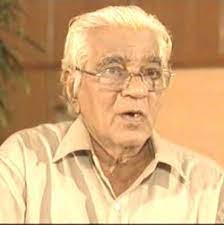 ManoharRai SarDessai (1925-2006) foi professor de Francês nas universidades de Bombaim e Goa; editor de vários periódicos literários; presidente da conferência pan-indiana do Concani; tradutor de obras literárias e históricas; mas, acima de tudo, um dos maiores e mais queridos poetas da língua concani, graças à elegância da sua linguagem e à relevância dos temas que tratava.
ManoharRai SarDessai (1925-2006) foi professor de Francês nas universidades de Bombaim e Goa; editor de vários periódicos literários; presidente da conferência pan-indiana do Concani; tradutor de obras literárias e históricas; mas, acima de tudo, um dos maiores e mais queridos poetas da língua concani, graças à elegância da sua linguagem e à relevância dos temas que tratava.
SarDessai é tanto goês como cosmopolita, tanto príncipe quanto homem do povo. Nas suas palavras, ‘Hanv Gõycho ani Gõyam bhailo, udenticho ani ostomtecho: Sou de Goa e do além; sou do Leste e do Oeste’.
A sua poesia tem a toada da palavra falada. Foi, sem dúvida, feliz a sua ideia de passar a escrever em concani, sua língua materna além de lngua da terra, quando, aliás, a comunidade hindu prezava o marata como a sua língua de cultura.
Afirma o Poeta Madhav Borcar que a poesia de SarDessai divide-se em dois períodos: pré- e pós-1961, sendo este o ano da integração de Goa na União Indiana.[i] Neste período foi um dos responsáveis, junto com R. V. Pandit e C. F. Costa, por lançar as raízes da nova poesia concani.
Goyãm, tujea moga khatir [Por teu amor, ó Goa!] (1961) abarca, principalmente, a poesia que escreveu durante a estadia na França (1952-58).[ii] Fala com saudade das vozes e paisagens da terra natal e das alegrias e tristezas da vida campestre. Não admira que o seu lirismo tenha atraído a geração contemporânea de literatos.
Regressando de vez a Goa, teve várias intervenções na vida pública. O seu livro Zaiat Zage (1964) é uma forte expressão do seu sentido cívico.[iii]
É particularmente memorável a sua intervenção no destino político da sua terra aquando do histórico Opinion Poll (escrutínio da opinião), realizado em 1967: pôs todo o seu peso a favor da autonomia de Goa contra os planos integracionistas do estado vizinho do Maharashtra. Alguns dos seus mais patrióticos poemas datam desse período, altura em que eles estavam sempre nos lábios da gente.[iv]
SarDessai dirige-se ao grande público com facilidade, graças ao seu dom das línguas: exprime-se em concani, marata, francês e inglês, às vezes, traduzindo ele próprio os seus poemas. Mais significativo, porém, é o Poeta se ter tornado acessível ao público goês, a partir do ano de 1961, pois a escolha do alfabeto e a multiplicidade de dialectos os dividia. Fez questão de escrever em caracteres latinos e devanagáricos, construindo uma ponte entre os falares das comunidades hindu e cristã – como que uma língua franca.
Os poemetos de Zaiô Zuiô [Jasmim] (1970) e Pissolim [Borboletas] (1978) são caracterizados pela economia e precisão vocabular (cinco a sete versos). Ao segundo livro de poesia foi atribuído o Prémio da Sahitya Akademi (Academia indiana de Letras), em 1980.
SarDessai escreveu também poesia para crianças, sendo ‘Bebeanchem Kazar’ [O casamento dos sapos] o seu poema mais popular, pela rima e ritmo.
De igual modo, produziu poemas de louvor a Jesus e Maria. [v]
Os três poemas incluídos neste artigo falam do seu amor à terra e da sua filosofia da vida[vi] Na ‘Oração’, diz com toda humildade: ‘Que a minha aldeia se orgulhe/dos meus feitos, do meu nome,/ tanto basta para mim,/não almejo outro renome.’ Colheu, porém, muito mais: além da afeição do povo, os epítetos Lok Kovi[vii] (Poeta do Povo) e Konknni Kovirai[viii] (Príncipe dos Poetas concanis).
Gõycho Ambo
Gõycho ambo
Mhonva thembo
Gõychea polear
Bhangra tibo.
Gõychea ambeant
Chandnem asa
Suriachem kirnn asa
Amchea mogall zomnintlea
Amrutacho kollso asa
Zaia-zuiam poros dhatt
Gõychea ambeak ghomghomat
Bhurgeachea galaporos
Gõycho ambo rosroxit
Vhonklechea onttaporos
Gõycho ambo lusluxit
Halot, dholot, lozot, moddot
Pachvo podor angar gheta
Sotravem vors futtun
Gõychea ambeant rupak ieta.
Gõycho ambo rosall kovit
Gõycho ambo Gõychem jivit.
A manga de Goa
A manga de Goa
Um pingo de mel,
Um bocado de oiro,
A Manga de Goa.
Um disco da Lua,
uma réstia de Sol,
a Manga de Goa.
Um bouquet de champôs
e de cravos rubros,
a Manga de Goa.
Mimosa
como a face de uma criança,
Voluptuosa
como os lábios de uma noiva,
nossa riqueza,
nosso orgulho,
a Manga de Goa.
Sob o verde véu,
como o seio de uma virgem
na flor dos anos,
entre tímido e ousado,
a Manga de Goa.
Um poema de sumo,
Uma lasca de alegria,
a Vida de Goa,
A Manga, pomo de oiro.
(Traduzido por Carmo Azevedo) [ix]
Gõy mhojem
Gõy mhojem vhonkol koxi
Panchvea chuddean bhol’leli
Gõy mhojem rat nilli
Noketranim ful’leli.
Gõy mhojem bhurgem koxem
Dongramche manddiecher
Gõy mhojem mogre-kollo
Doriache talliecher.
Gõy mhollear chitr ek
Indradhannun rongoil’lem
Gõy mhollear sop’n ek
Ugddasani vinnlelem.
Gõy mhojem kuberachea
Vozranchi ukti kudd
Gõy mhollear jivitachea
Zoitachi zollti chudd.
Gõy mhollear pavl ek
Dortorechi vatt mezpi
Gõy mhollear tan ek
Vixvacho tal sodpi.
Gõy mhollear konvlli odd
Kallzantlea kavteachi
Gõy mhojem vhoddli zodd
Zolmachea punneachi.
Minha Goa
Minha Goa é como uma noiva
de pulseiras enfeitada.
Minha Goa é noite azul
de estrelas matizada.
Minha Goa é como criança
entre montes passeando.
Minha Goa é botão de flor
à tona do mar vogando.
Goa é um painel
pelo arco de Indra colorido.
Goa é um sonho
de memórias tecido.
Minha Goa é corpo aberto
de riqueza diamantina.
Goa é um facho ardente
duma vida vitorina.
Goa é uma pegada
que os caminhos vai medindo.
Goa é sede sempre em busca
do fundo do mundo infindo.
Goa é ânsia juvenil
do âmago do coração.
Grande é o mérito de quem tem
de em Goa nascer o condão.
(Traduzido por: Jorge de Abreu Noronha)[x]
Magnnem
Sompem utor, saral mon
Itlem mhaka mellchem dhon.
Tambddo patt, pachvem pan
Itlo mhaka puro man.
Svarthachi virchim kupam
Itli mhojer korchi krupa.
Mhaka lagun ful’lo ganv
Itlem mhaka puro nanv.
Oração
Palavra de leveza
e mente sem paleio,
é isto o que eu anseio
como única riqueza.
De rubro lenho um banquinho,
folha verde de banana,
nenhum outro preito espero
ao longo do meu caminho.
Que se esvaiam no horizonte
essas nuvens de ganância:
seja apenas esta a graça
a adornar a minha fronte.
Que a minha aldeia se orgulhe
dos meus feitos, do meu nome,
tanto basta para mim,
não almejo outro renome.
(Traduzido por Jorge de Abreu Noronha)
——————————————————————————————————————————–
[i] Madhav Borcar, ‘Manoharraiali Kovita’, in Atthara Jun (Panaji: Goa Konkani Akademi, 2007), p. 160.
[ii] Doutorou-se na Sorbonne, apresentando a tese intitulada ‘Image de l’Inde en France’, cf. Edith Noronha Melo Furtado, Les Oeuvres de Manohar Rai Sardessai: Point de Rencontre entre l’Inde e la France (Delhi: Goyal Publishers and Distributors Pvt Ltd, 2014).
[iii] De entre outros poemas, escreveu ‘Hi Lokshay’ [Esta democracia], ‘Hundranchi sabha’ [Assembleia de Ratos], que ora fazem parte da antologia Atthara Jun, op.cit.
[iv] Entre outros, ‘Zaiat Zage’ e ‘Ailo Poll’ [Lá vem o Escrutínio].
[v] Entre outros, ‘Ball Jezu Zolmolo’ [Nasceu o Menino Jesus], ‘Khursachi Kanni’ [A História da Cruz], ‘Mhozo Jezu ailo porot’ [Voltou o meu Jesus], ‘Mari Matêk Ballok Zala’ [Teve um Menino a Mãe Maria]; e ainda em homenagem ao S. José Vaz: ‘Khõi Pavlo? Khõicho tum?’ [Donde vens? P’ra onde vais?]. Cf. My Song – Ma Chanson – O meu Canto (Goa: 2008).
[vi] Da escolha de Maya SarDessai, filha do Poeta, a quem agradeço; tirados da colectânea My Song – Ma Chanson – O meu Canto, op. cit.
[vii] Atribuído por Bakibab Borcar, outro gigante da poesia concani.
[viii] Título que lhe foi conferido no concurso de poesia concani inédita, realizado no Clube Nacional, de Pangim, em 2 de janeiro de 1966 (Cf. ‘Prefácio’ de Maria Aurora Couto, ao livro My Song – Ma Chanson – O meu Canto, op. cit., p. 119).
[ix] Carmo Azevedo (1912-2003) foi médico, jornalista e investigador de história e arte goesas.
[x] Jorge de Abreu Noronha (1930-2007), um goês radicado em Portugal, foi um dos principais promotores da ideia de publicar o volume trilíngue (Minha Canção – Ma Chanson – O meu Canto) dos poemas de SarDessai.
Publicado na Revista da Casa de Goa, Serie II, No. 16, Maio-Junho de 2022, pp 38-41. II Série – N.º 16 – Maio/Junho de 2022 – Casa de Goa
Let the whole world know
It warms the cockles of our hearts to watch two great giants in the marvellous project of evangelisation: Peter and Paul. While Peter speaks to the Jews in particular, Paul reaches out to the Gentiles. Luke devotes to them the greater part of the ‘Acts of the Apostles’, a book carved out from his Gospel. From there is taken the first reading of all the Sundays of Easter until Pentecost Sunday. The book's second half (chapters 13-28) covers three missionary journeys that Paul undertook, between A.D. 46-48, to Asia Minor (major part of modern-day Turkey), to Greece, and finally to Rome, which was the heart of the gentile world.
The Jews, entitled to travel throughout the Roman Empire, would seek and speak to other Jews in any important city they visited. For instance, in Antioch of Pisidia, Paul and Barnabas, a prominent early, Jerusalem Christian of Cypriot Jewish extract, visited the Jewish community at their sabbath gatherings in the synagogue. Out of deference to him as a visitor, they asked Paul to be the commentator of the day. Paul seized the opportunity to highlight a series of facts that not only give Jewish history its meaning but also clearly point to Christ. Paul showed that God’s promises to Israel were fulfilled in the Resurrection.
What Paul spoke on the following Sabbath forms the crux of today’s reading (Acts 13: 14. 43-52). This time, Paul did not address the Jews alone but all the God-fearing, including non-Jews. This approach achieved three things: it proved that Paul was no racist; it brought hope to the gentiles; and it precluded the Jews from feeling superior to others, in the belief that only they were worthy of hearing God’s word and being called His children.
From the people’s response it is evident that they were thirsting to hear the Good News. The following sabbath they brought along other pagans. Although such progress aroused jealousy, revilement and persecution from the Jews, the inspired duo did not cower down. Behold their parting shot: ‘It was necessary that the word of God should be spoken first to you. Since you thrust it from you, and judge yourselves unworthy of eternal life, behold, we turn to the Gentiles. For so the Lord has commanded us.’ And then, Paul and Barnabas shook off the dust from their feet and went out to the uttermost parts of the earth.
For his part, John, on account of his faith, was deported to Patmos, a Greek island in the Aegean Sea, around the year A.D. 95. The youngest of the Lord’s apostles, he died thereabouts in his mid-nineties. The place is now famous as the location where the Evangelist received the visions that we read about in the Book of Revelation. Here he addresses Christians suffering for the faith, in imitation of Christ.
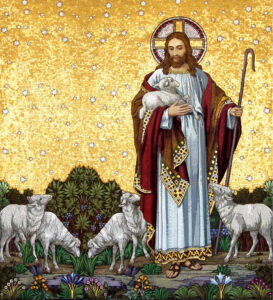
Seeing how the Jews as a whole did not accept Jesus, the apostles’ effort might have seemed a complete failure. John, however, has an optimistic vision. The ‘four angels’ he refers to earlier in the chapter refers to the elect, or say, the Jews who followed Jesus as well as those who did not believe in Him, through no fault of their own, but who were saved through His Death and Resurrection. ‘A great multitude which no man could number, from every nation from all tribes and peoples and tongues, standing before the throne and before the Lamb’ thus points to the incredible success of the salvation of humanity.
Are the ones who will be saved always those ‘who have come out of the great tribulation’, that is, martyrdom? Obviously, not all will die as martyrs, but Christians should have continually before their eyes those who have died for the faith. By God's grace, those who serve Him night and day will hunger and thirst no more; He who sits upon the heavenly throne will shelter them and wipe away every tear from their eyes. That is to say, the Lamb of God will double as their Shepherd and guide them to springs of living water.
This is precisely the theme of the day's Gospel (Jn 10: 27-30). Jesus the Son of God is the ‘Good Shepherd’ who promises his sheep eternal life. His flock is not synonymous with the Jewish nation or any other; it is those who believe in Him that comprise His flock. He invites people from different nations or civilisations; they will recognise His voice and believe in His Word. This being the focus of the fourth Sunday of Easter, aptly called ‘Good Shepherd Sunday’, all three lectionary cycles draw from the same chapter of John.
Thus, the readings of today dwell on the messianic role of Jesus: He is the Lamb of God; He is the Good Shepherd; He is the Bread and Water of Life; He is our Saviour. Those who believe in Him and follow Him will be saved. This is a message that we are duty-bound to spread with passion and conviction, letting the world know that Jesus is Lord of the Universe and our most precious Saviour.
Called to give witness to Christ
We can see the wonders that the Lord has made; we can see the Holy Spirit at work. In the first reading (Acts 5: 27-32, 40-41) the Apostles are a transfigured lot, full of courage and enthusiasm. Questioned a second time by the high priest, they give a spirited and gutsy witness about the Risen Lord. Peter, clad with the authority imparted by the Master, proclaims His Death and Resurrection. Equally important, to those who have eyes to see and ears to hear, Peter makes known that Jesus Christ is in their midst, in flesh and blood, as the Lord and Saviour of the world.
It is truly heartening to know that Jerusalem was filled with the Apostles’ teaching: today, we are called to do the same around us, in the cities and villages we live in. The Apostles steadfastly brought the Good News to their people, Israel: who could deny the Passion, Death and Resurrection of our Lord? In a bid to disown their part in the brutal killing of Jesus, the authorities sheepishly urged the preachers not to speak in His Name, and they let them go. For their part, the Apostles were ever-ready to ‘suffer dishonour’ – a death like His – for His sake.
What did the Apostles go ahead and preach, they who until yesterday seemed shaky, weak and tired? In one word, they simply gave witness to their faith. What is reported in verses 29-32 is a summary of the apostolic preaching, pointing to its most essential elements, a rough-and-ready reckoner for us. This should be the posture of every committed Christian: to continue in Peter’s footsteps, proclaiming Jesus in good times and in bad; to obey God rather any human authority. Indeed, all of this makes up the life of the Church and what we are called to be and do as Christians!
 Not only was the earthly Jerusalem filled with echoes of Jesus’ Holy Name; from the second reading (Rev 5: 11-14) it is clear that there was rejoicing in the New and Eternal Jerusalem as well. St John heard the voice of angels singing, ‘Worthy is the Lamb who was slain, to receive power and wealth and wisdom and might and honour and glory and blessing!’ And every creature in heaven and on earth, under the earth and in the sea repeated the praises, saying, ‘Amen!’ Which means that, upon His Resurrection, the whole of creation joyfully veered towards Him who is the Lord of Heaven and Earth, the centre of all creation.
Not only was the earthly Jerusalem filled with echoes of Jesus’ Holy Name; from the second reading (Rev 5: 11-14) it is clear that there was rejoicing in the New and Eternal Jerusalem as well. St John heard the voice of angels singing, ‘Worthy is the Lamb who was slain, to receive power and wealth and wisdom and might and honour and glory and blessing!’ And every creature in heaven and on earth, under the earth and in the sea repeated the praises, saying, ‘Amen!’ Which means that, upon His Resurrection, the whole of creation joyfully veered towards Him who is the Lord of Heaven and Earth, the centre of all creation.
Is Jesus the centre of our lives? Are we geared up to repeat the sounding joy? Given that the imprint of God’s law is in our hearts, as St Paul says, we should be continually praising Him in word and deed. Our hearts should be restless until they rest in Him. Here, I remember what my dear Avó (grandmother) used to say: ‘When we see God face to face one day, it is only Him and none else that we shall contemplate.’ Let’s look forward to that day when we will be at least palely worthy of such a privilege!
Holy privileges come our way as we journey on our earthly pilgrimage. In the Gospel (Jo 21: 1-19), after preparing the disciples, by means of the miraculous catch, which was carried out under Peter’s leadership and in his boat, Jesus indicates that Peter will be the Shepherd of His only flock from the moment Jesus departs and until His Second Coming. Peter would shoulder the responsibility of the first Church; he who was a mere fisherman was called to be a fisher of men.
That Jesus showed up on the beach, unannounced, while some of the disciples were about to going fishing, simply means that an encounter with the Lord can happen anytime, anywhere, anyhow. He met them on the lonely shore in the light of dawn; where will He meet us? Jesus asked Peter if he loved Him; what about us? Do we love Him and Him alone, or is He just one among many? And then, when He says, ‘Follow me,’ will we readily do so? We may not be called to lead, but are we ready to follow? The life of the Church and our own salvation hinges on our response.
The Resurrection and our Faith
Thanks to Easter, Sunday came to replace the Sabbath as the Day of the Lord. We now gather very especially on this day, to witness the mystical renewal of the Holy Sacrifice of Calvary and to participate in the Real Presence of Christ in the Holy Eucharist. By doing so, we do not merely fulfil an obligation but a personal need for ever-closer union with God.
We might expect Jerusalem to have been a city transformed after the momentous event of the Resurrection; we might imagine news of the Resurrection to have spread like wild fire to make it known that Jesus is God. But none of that happened. The city and the world were wrapped up in themselves, as though nothing had happened. How fortunate that you and I can cherish our Easter meeting with the Lord!
It is delightful that Easter does not last just a day but forever, although liturgically, it is a fifty-day period until Pentecost (seventh Sunday after Easter). In the run-up to this Sunday, there is a deluge of post-Resurrection stories that will hold us in awe and give our faith a boost. Through the week we have heard narratives – from the Acts of the Apostles and the four Evangelists – and we have three more today.
In the First Reading (Acts 5:12-16), the Apostles begin to feel the power of the Risen Lord. After they had been afraid and not knowing what to do, Jesus empowered them to preach the Good News and to forgive sins. So, they began to teach with authority and heal with compassion. They were like clones of the Master, his hands and feet, working wonders in His Holy Name. Yet it was not by their miracles alone that believers were added to the Lord; it was by the Holy Spirit’s action on minds and hearts that the numbers steadily rose.
After the Resurrection, the Apostles came to be held in high honour, yet theirs was not a runaway victory. Sometimes, they faced persecution and even ran into doctrinal tangles. But as the Second Reading (Rev 1:9-11A, 12-13, 17-19) makes it clear, God was in control, as He always is. The Divine Master had promised that He would be with the Apostles every step of their way and His work would prevail over any persecution.
Today, we see St John, who was exiled for the faith in the tiny rocky island of Patmos in the Aegean Sea, warmly comforted and gently prodded by Jesus’ words that defy paraphrasing: ‘Fear not, I am the first and the last, and the living one; I died, and behold I am alive for evermore, and I have the keys of Death and Hades. Now write what you see, what is and what is to take place hereafter.’
What utterances of deep reassurance, of wisdom, of truth, expressing the ultimate reality! Here is the water of life – if we drink of it, we will thirst no more. Here is the bread of life – if we eat of it, we will never be hungry. Yet, how many from among the learned and worldly-wise today would believe in Him who is the Author of Life; the Master Physician; the Good Shepherd; the Lamb of God; the Light of the World; the Prince of Peace; the Son of the Living God; the Way, the Truth and the Life?
 In the Gospel passage (Jn 20:19-31), we meet Thomas who has meanwhile gone down in history as the ‘Doubting Thomas’. He had been sceptical of his companions’ account, not of the Resurrection per se. Without taking amiss his interim refusal to believe, Jesus let Thomas feel His crucifixion wounds. That the disciple stopped short of touching Him and instantly believed, saying, ‘My Lord and my God’, does credit to the future Apostle of India. Of course, Jesus rounded it off with a ‘beatitude’: ‘Blessed are those who have not seen and yet have come to believe’, commending those who approach divine claims with eyes of faith.
In the Gospel passage (Jn 20:19-31), we meet Thomas who has meanwhile gone down in history as the ‘Doubting Thomas’. He had been sceptical of his companions’ account, not of the Resurrection per se. Without taking amiss his interim refusal to believe, Jesus let Thomas feel His crucifixion wounds. That the disciple stopped short of touching Him and instantly believed, saying, ‘My Lord and my God’, does credit to the future Apostle of India. Of course, Jesus rounded it off with a ‘beatitude’: ‘Blessed are those who have not seen and yet have come to believe’, commending those who approach divine claims with eyes of faith.
Thanks to this unforgettable story (which only St John and the not the synoptic Gospels mention, and is read on the Second Sunday of Easter regardless of the year cycle), we get to understand the true nature of the Resurrection and of the faith we must cultivate: First, that Jesus rose physically and not by means of some virtual reality technique! Second, that seeking a proof does not work against but rather confirms a person’s faith. Thirdly, that doubt can indeed be part of our faith journey and even lead to great turnarounds – an experience so human that Thomas’ words are acknowledged after the Agnus Dei in the Holy Mass.
In conclusion, the Readings of today invite us to look into our own faith experiences; to not be afraid to proclaim the Gospel; and to humbly turn our gaze to Christ and experience His love and mercy, particularly on the Feast of Divine Mercy that is celebrated today. A very Happy Feast to you all!
Easter, a joy for ever
After a slew of emotions that we experienced through the forty days of Lent, finally that time of the year has arrived when we have much to rejoice over! The Lord is risen: it’s Easter! Alleluia!
How did the Resurrection come to be called ‘Easter’? The ninth-century monk Venerable Bede says the name derives from Eostre, the spring month named after the pagan goddess of fertility. Others say the root of ‘Easter’ goes back to Old English, with a Germanic root related to the cardinal direction East, and yet others point to the Latin aurora, dawn. So, ‘Easter’ is only a colloquial substitute for ‘Pasch’! Be that as it may, Lent is indeed be a springtime for the soul and, if Christ be the Sun, Easter is easily a new dawn for the Christian world.
But, hugely more important than etymology is Christ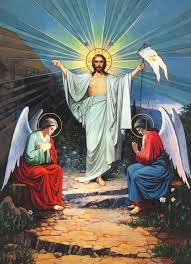 We know that Christ was on a visit to the City of David, to celebrate the Jewish Passover, when He was summarily arrested and crucified. Looking back, there was no longer any use for the animal sacrifice: Christ Himself had become the Paschal Lamb. Then, with His glorious Resurrection on the third day, He introduced humankind to a New Passover, which we call Pasch or Easter.
We know that Christ was on a visit to the City of David, to celebrate the Jewish Passover, when He was summarily arrested and crucified. Looking back, there was no longer any use for the animal sacrifice: Christ Himself had become the Paschal Lamb. Then, with His glorious Resurrection on the third day, He introduced humankind to a New Passover, which we call Pasch or Easter.
Whether the ‘third day’ was meant to be a period of seventy-two hours or less is of no consequence! At any rate, the Resurrection was an unprecedented happening. The earth-shaking event established Christ’s divinity and validated all His claims and promises. Humankind had indeed met face to face with the True God. No wonder it led to the establishment of a new religion – Christianity.
Whereas our ancestors in faith met God in person and witnessed the Resurrection, many may wish to know the practical significance of the happening to our day and age. Indeed, to us, Easter is a complete gamechanger; its joy transforms us and the way we look at life. And who can fail to appreciate Christ’s message of love and compassion? Has it not made the world a better place to live in? And although physical suffering proper to the human condition lingers on, humankind has been freed from the oppression of sin.
Finally, Christ’s Resurrection is a guarantee of our eternal salvation and that we will be raised from the dead at His Second Coming. St Paul says, ‘If there is no resurrection of the dead, then Christ has not been raised. And if Christ has not been raised, our preaching is empty and our belief comes to nothing.’ (1 Cor 13-15) Hence, Resurrection is the cornerstone of our faith. Its commemoration is no hollow ritual but a meaningful commemoration; it is not just another day but a watershed in the history of salvation.
We say we are an Easter people and Alleluia is our song! This line attributed to St Augustine and popularised by St Pope John Paul is an apt description of our Christian identity. We are to be recognised not by the dress we wear or the food we eat, but by the way we conduct ourselves – with joy; by the way we treat one another – with love; and by the way we relate to our God – body and soul, with hope, praise and thanksgiving.
Easter brings us hope. With its splendour before our eyes, no matter what the circumstances, Easter is a joy for ever.
From Palms to The Passion
It is interesting to note the Liturgy of the Word on Palm Sunday, also referred to as Passion Sunday. While the first two readings and the psalm – Is 50: 4-7; Ps 21: 8-9, 17, 18a, 19-20, 23-24; Phil 2: 6-11 – remain the same for cycles A, B and C, the Gospel changes from year to year, highlighting the three Synoptics: St Matthew (26: 14-27, 66), St Mark (14: 1-15, 47), and St Luke (22: 14-23, 56), respectively. They give an account of the Last Supper, the Agony in the Garden, the unfair Trial, the Way to Calvary, and the Crucifixion and Death.
Thus, St John is the only evangelist who does not figure on Palm Sunday. The Beloved Disciple – who offers a selective and somewhat different perspective on the Divine Master, more theological and mystical – is very especially reserved for Maundy Thursday (Jn 13: 1-15) and Good Friday (Jn 18: 1-19, 42), besides two weekday readings. While the Gospel of Thursday focusses on the Last Supper, that of Friday is a Passion narrative that begins with Gethsemane and ends with our Lord’s Death on the Cross.
That much for the readings. Now, as regards the designation of the sixth Sunday of Lent: it is officially called ‘Palm Sunday’, recalling the day when Jesus arrived to a hero’s welcome for the Passover in Jerusalem. No wonder, Chesterton’s ‘Donkey’ was ecstatic: ‘There was a shout about my ears, And palms before my feet,’ he said. But what determined the choice of that beast ‘with a monstrous head and sickening cry’, ‘the tattered outlaw of the earth’?
Jesus had walked up to Jerusalem in the past. Although the Synoptics speak of just one Passover, St John states that He celebrated three Passover Feasts in the city of David. Yet, this time he chose to use a donkey, to enter in peace, as a king traditionally did, into a city that was his very own – unlike a conquering king that arrived on a warhorse. Jesus borrowed a colt, which was soon thereafter returned to its owner, fulfilling many Old Testament allusions, the most important being 'Behold, O Jerusalem of Zion, the King comes onto you meek and lowly riding upon a donkey.' (Zech 9: 9)
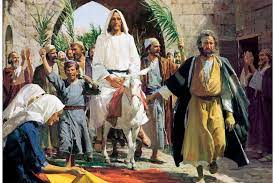
But what were the crowds so excited about that they should thus cheer Jesus? Pope Benedict XVI, in his book Jesus of Nazareth, states that ‘Jesus had set out with the Twelve, but they were gradually joined by an ever-increasing crowd of pilgrims.’ On the way, the blind Bartimaeus who was cured clinched it; he became a fellow pilgrim on the way to Jerusalem. The miracle filled the people with hope that Jesus might indeed be the new David for whom they were waiting.
Jesus was not going to re-establish the Davidic kingdom – far from it! He had always said that his kingdom is not of this world. Yet, the disciples’ act of enthusiastically seating Jesus on that beast of burden was ‘a gesture of enthronement in the tradition of the Davidic kingship’; the pilgrims who, infected by that enthusiasm, joined in spreading out their garments and waving out palms, mirrored a tradition of Israelite kingship; and their exultant cries, though reported differently by the Evangelists, all point to the Old Testament. Still, those players were blissfully unaware that they had fulfilled the Scripture.
The most important part of Scripture, however, was played out by Jesus Himself. He who had come to celebrate the ‘Passover of the Jews’, as the Synoptic Evangelists call it, was in truth observing ‘the Passover of His death and Resurrection’, as St John the Evangelist puts it, for this is what the Saviour said to His disciples: ‘I have been very eager to eat this Passover meal with you before my suffering begins. For I tell you now that I won’t eat this meal again until its meaning is fulfilled in the Kingdom of God.’ (Lk 22:15-16). Jesus fulfilled the Passover by becoming the Sacrificial Lamb.
Our Saviour’s triumphal entry into Jerusalem quickly led to His sorrowful Passion on Calvary. And that is how ‘Palm Sunday’ becomes synonymous with ‘Passion Sunday’ in the Liturgy of the Word.
Has our Lenten spirit slackened?
Is the deletion of Passiontide from the liturgical calendar a sign that our Lenten spirit has slackened? Do we therefore need to step up our acts and symbols to drive its point home?
The fifth Sunday of Lent was traditionally called ‘Passion Sunday’, marking the beginning of ‘Passiontide’. During this two-week long period, which comprised the ‘first’ and ‘second’ Passion Sundays, the Church would intensify her preparations for the Holy Triduum and Easter celebrations. However, with the liturgical reforms of the Second Vatican Council, ‘Passion Sunday’ was practically done away with; the name is, at best, second to the official designation ‘Palm Sunday’, which marks the beginning of Holy Week.
Thus, not only Passiontide as a distinct liturgical season within Lent but, eventually, even the term ‘Passion Sunday’ came to be abolished. This was done ostensibly because the notion of the Passion, that is, the suffering and death of Jesus Christ, is already contained within the forty days of Lent. It was also thought to be potentially confusing and distracting to have a season within a season.
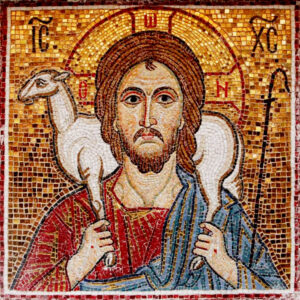 Critics of the abolition, however, point out that such an approach is not consistent across the 1970 Roman Missal, for instance, at Advent.[1] They also opine that ‘the overly-rationalist logic of the [post-Vatican liturgical] reform came up against the traditional piety and practice of the Church.’[2] Even so, from Monday of the fifth week of Lent onward, the Church tries to preserve the liturgical and devotional intensity of the old Passiontide through liturgy, hymns and rubrics, but refrains from explicitly stating so.
Critics of the abolition, however, point out that such an approach is not consistent across the 1970 Roman Missal, for instance, at Advent.[1] They also opine that ‘the overly-rationalist logic of the [post-Vatican liturgical] reform came up against the traditional piety and practice of the Church.’[2] Even so, from Monday of the fifth week of Lent onward, the Church tries to preserve the liturgical and devotional intensity of the old Passiontide through liturgy, hymns and rubrics, but refrains from explicitly stating so.
This goes to prove that there is an unstated need for intensification of the Lenten fervour over a period longer than just a week. Earlier, the most obvious example of a more sombre mood was the veiling of statues and images, which remains an optional practice in the current Roman Missal. Another was the feast of the Seven Sorrows of the Blessed Virgin Mary on the first Friday of the Passiontide, now transferred to September. Various other practices occurred during the final two weeks of Lent, such as Stations of the Cross and the Tenebrae services. In short, Passiontide was meant to be a special penitential period where the faithful focussed more intensely on Jesus’ bitter passion and fostered in us sorrow for our sins.[3]
Meanwhile, the traditional Roman Missal (as well as several other Christian denominations) observes this special time in the Church’s calendar quite austerely. It is one of the many treasures of the traditional rite that can be regarded as a feast for the soul; their solemnity, beauty, and spiritual benefits are undeniable. As part of the ongoing reassessment of the liturgical reforms, Pope Benedict XVI, himself an architect of Vatican Council II, states:
‘In the history of the liturgy there is growth and progress, but no rupture. What earlier generations held as sacred, remains sacred and great for us too, and it cannot be all of a sudden entirely forbidden or even considered harmful. It behoves all of us to preserve the riches which have developed in the Church’s faith and prayer, and to give them their proper place.’[4]
In times gone by, civil law would unite with Church law to ensure that the faithful understood and gave due importance to Lent. Today, the secular world unites with watered-down ecclesial practices, wittingly or unwittingly making sure that only a few consciously live through Lent. Our bustling lifestyles and the dazzling city lights conspire to dish out utterly Godless experiences that leave us morally and spiritually crushed – ‘snuffed out like a wick’.
But let us not be disheartened. Let us devise a Lenten routine that will advance our individual and collective spiritual growth through spiritual reading, appropriate music, meditation, prayer, confession, the Holy Eucharist, fasting and almsgiving. Let not the Passiontide ebb within us. And then, in a couple of weeks, when we look back on how we had let the austerity of Lent wage war on our sensual appetites, we will surely feel a regeneration of body and soul, and what is more, witness the birth of an authentic joy with which to welcome the feast of Easter.
[1] Special Mass propers were assigned to the last few days of Advent (17th-24th December), to give extra emphasis to the end of this season and assist the faithful to prepare for the celebration of the Lord’s first coming. Clearly, the Council did not think this extra emphasis affected the unity of Advent, or could have been confusing for the faithful. Why, then, did they think that keeping Passiontide would affect the unity of Lent or be confusing? Cf. https://rorate-caeli.blogspot.com/2021/03/the-fate-of-passiontide-in-post-vatican.html Accessed 2 April 2022
[2] https://rorate-caeli.blogspot.com/2021/03/the-fate-of-passiontide-in-post-vatican.html Accessed 2 April 2022
[3] https://aleteia.org/2017/03/30/what-is-passiontide/
[4] Benedict XVI, Letter on the occasion of the publication of the Apostolic Letter “motu proprio data” Summorum Pontificum, on the use of the Roman liturgy prior to the Reform of 1970. 7th July 2007 (http://www.vatican.va/content/benedict-xvi/en/letters/2007/documents/hf_ben-xvi_let_20070707_lettera-vescovi.html) Accessed 2 April 2022
[Banner: Dreamstime.com]
God’s Infinite Love and Mercy
The readings of the fifth Sunday of Lent (Is 43: 16-21; Phil 3: 8-14; Jn 8: 1-11) invite us to be humble, show love and mercy to our neighbour and, in turn, experience God’s loving kindness. They illustrate the same challenge and hope that we daily encounter in the Lord’s Prayer: ‘Forgive us our trespasses as we forgive those who trespass against us.’
Who can deny that by our modern, rationalist approach to life we are easily given to pride and pessimism? This is the bane of our times. But, as Christians, we cannot allow ourselves to lose hope; the Israelites hoped in God and He rescued them from Babylon. And does He not rescue us from the vagaries of our individual and collective lives? He is a great, big, wonderful God, always opening up 'a way in the wilderness and rivers in the desert.' He bids us to refrain from dwelling on the past, on the things of old; he wants us to become a new people, for whom He will do marvellous new things.
It is obvious that God is not dead; He is present in history and continues to fulfil His work of salvation in the Church and the world at large. He knows each and every one of us so intimately and loves us so tenderly that only an unfeeling person will fail to reciprocate. For his part, St Paul says, ‘Once I found Christ, all those things that I might have considered profit, I reckoned as loss… garbage.’ The Apostle of the Gentiles employs superlatives only to better express the absolute value that is Christ, the Son of the Living God.
Knowing Christ is by far the highest ideal that a Christian can desire. It is not a mere intellectual knowledge of Him but a personal relationship with Him. that. Notice how Saul who was once a persecutor of Christ turned out to be one of His greatest advocates, Paul: he who was a sinner was completely transformed by his faith in Christ. Likewise, Jesus who has crossed from death to life helps us cross from a life of sin to a life of grace. Let us praise and thank Him for kindly conquering us.

Finally, the Gospel passage: a luminous example of how God welcomes us with arms open wide. The moment He finds even a hint of repentance in our hearts, His healing power is at work in us. The adulterous woman’s dramatic encounter with Jesus is an example of God’s infinite love and mercy. Jesus does not condone her act – ‘Sin no more’, He tells her, in no uncertain terms – but He forgives her fault. Our Creator, who knows best how we are engaged in a hard battle against sin, is always there for us.
What a lesson that is for us who take the moral high ground! Are we not swift to detect the speck in another’s eye while failing to see the log in our own? About the Scribes and Pharisees who brought that woman to Jesus, says Fulton Sheen in his Life of Christ: ‘So set were they on their barren controversy with the Messiah that they did not scruple to use a woman’s shame to score a point.’ That is the bitterest degradation a woman could suffer. The charge being almost irrefutable, how would Our Lord choose between the Law of Moses, which ordered death by stoning, and His own prescription of love and mercy?
It was a tricky matter. The Roman rulers reserved the right to impose a death penalty, whereas by the Mosaic Law an adulterous woman was to be stoned by the people. Which of the laws would Jesus apply to her? Either choice would be an affront to the other. Further, if Jesus had condemned the woman, they would say He was not merciful; if He had condoned her act, He would be contravening the Mosaic law. And what is more, by disobeying this divine directive, He would be negating His own divinity. Hence, their knotty question: ‘What do you say about her?’
As the popular saying goes, ‘Those who live in glass houses should not throw stones.’ Jesus expressed it in more challenging terms: ‘Let him who is without sin among you be the first to throw a stone at her.’ Who was fit enough to defend or execute the Mosaic Law? They were sinners, yet accusers; whereas Our Lord, the only Innocent One, refrained from accusing. His mission was to save the soul. He had said in the Sermon on the Mount, ‘Pass no judgement, and you will not be judged, for as you judge others, so will you yourselves be judged, and whatever measure you deal out to others will be dealt back to you.’
Then again, there is the question of gender discrimination (glaring to our modern eyes): what about men involved in that reprehensible act? Why would they go scot-free? These and many other issues only Jesus, who was man and God, could resolve: He had come not to destroy the law but to perfect and fulfil it!
Today, Jesus invites us particularly to check the state of our souls rather than comment on our neighbours’. Let us admit to our sinfulness and be committed to change our miserable lives; and should we wish to fix our broken world, let love, fraternal correction and mercy be our tools. God will then put His finishing touches to our efforts, with His infinite love and mercy.
(Banner: Rubens, 'Christ and the woman caught in adultery')
